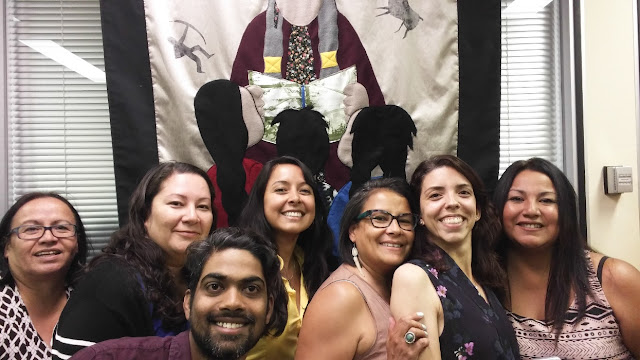By Vanessa Tait, 2nd year MDP student
The analogy of a cup of tea really resonates with my
journey in Aotearoa (New Zealand). Each time you would
be asked "let’s go for a cuppa" or "would you like a cup of tea?" meant that
there was going to be some knowledge exchange, a Hui
(meeting/workshop) would take place, a story told or an opportunity to share your
stories, knowledge and teachings. It was a moment of cross cultural learning
from one Indigenous group to another.
As I travelled through the many different
places: Ngaruawahia / Hopuhopu, Auckland, Waireinga/Bridal Veil Falls, Ragland
Beach, Rotorura, Taneautua (Ruatoki Marae - Tūhoe Iwi), Whanganui, Hobbiton,
Otorohanga – kiwi house and local museum, and many other places along the way;
I was amazed at the beauty of the landscape, the water and the people that I
crossed paths with.
The valuable aspects of this experience were the
importance of whaanau (family) and language, being proud of who
you are as an Indigenous person, and meeting many amazing Maori who truly
welcomed me and embraced my presence. I am inspired by the vision of the
Waikato-Tainui College for Research and Development and I take home with me the
desire to hopefully one day have a building and a place of learning for
the Indigenous peoples and communities in my region. It was amazing meeting the many people that
walked through the doors of the College and hearing about their stories,
research, goals and aspirations. The College provides a
safe space to come together and learn from one another.
I would like to acknowledge Sir Robert Mahuta
and the ancestors of this territory, the journey to Aotearoa had a true purpose
and with their visions, dreams and teachings still alive in this sacred place it
truly was a journey to remember.
Whaanau in Aotearoa
 |
| Sarah-Jane Tiakiwai (L) and Vee (R) |
An inspiration, role model, and Maori scholar,
Sarah-Jane Tiakiwai, was my mentor who took me under her wing and showed me so much
in my short time in Aotearoa. Sarah-Jane welcomed me into her whaanau and
took me for a visit to meet them in Taneautua.
This was an amazing experience and I will never forget so many people. Manawa, who
brings such love to this whaanau and to me. Aunty Ami and Uncle
Tim, my caregivers at the College, shared many
stories, taught me many things, and made me feel at home. Jube definitely was my greatest teacher,
he shared so much knowledge and we had many cups of tea together
exchanging many stories. Cuz Ruby and her whaanau shared so much knowledge,
teachings and even a few adventures. Amy and her two children
were such a joy to be around and our trips together will forever be
remembered. The College, whaanau and
staff; each and every one of them were a part of my journey and shared so much
with me. I felt
welcomed and embraced. Whaanau is
important and welcoming others to your family circle is amazing. No matter where they come from there is
always room for another in the house, there is no such thing as a nuclear
family there.
Trip to Whanganui
 |
| Trip to Whanganui |
We had the opportunity to travel to Whanganui by way of a 6.5
hour bus ride through hills and mountains, following the river (awa). Many great moments were had while
visiting Whakauae Research for Maori Health and Development and their amazing
circle of women. It was refreshing to
see how they worked, prayed, sang and had a feed together. The togetherness and the community spirit is
truly a wonderful thing to experience and observe. I had the opportunity to share the bear song
with them at the whakatau (welcoming and introductions) that began our journeys
there. We had the opportunity to go on
the waka on the Whanganui River (Awa) with four of the ladies. Grateful for
this experience, I was able to share a prayer and offering of tobacco with them
to the awa when we had completed our paddling journey. This was such an honour to share this moment
with them, as my grandmothers and traditional women teachers have taught me to
always give thanks to the water, the life blood of Mother Earth.
Research and Project
 |
| Journey in Aotearoa - Beautiful |
With the Waikato Raupatu River Trust, I researched and worked on a
framework for Indigenous tourism development for Indigenous peoples and
communities. It
utilized an Indigenous social enterprise approach that incorporates the
“quadruple bottom line” to guide the process forward that is
holistic in nature and involves the community.
In order to explain the Indigenous Tourism Framework, I used three Canadian
First Nations case studies, the
Gitga’at Nation (West), Mi’kmaw Nation (East) and Northern Quebec Cree, to give insight and identify
themes that could be found within the quadruple bottom line. The
document identified potential goals and factors for tourism development and
provided some recommendations, next steps and a
possible path forward.
Finally, these words resonate with me “be proud of who
you are and tell your story” - this is what I hold in my heart. My journey
and experience in Aotearoa really shed light on this
statement because the Maori are amazing, sovereign, strong, and inspiring
people and this field placement had a purpose and it was not just an academic
one, but one of spirit and of understanding the gifts we have as Indigenous
people. There was so much more to this journey, which I will share with you
over a cup of tea.
Ekosi, Vee





